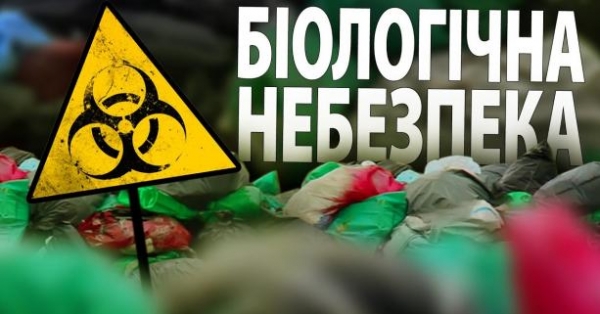In emergencies, the incidence of infectious diseases may increase. In the event of hostilities, the spread of pathogens can occur as a result of the use of biological weapons by the enemy, as well as the implementation of bioterrorist acts.
It is important to know the signs of the use of biological weapons by the enemy, to be able to act correctly to reduce the negative consequences in such situations.
YOU NEED TO KNOW
Signs of the use of biological weapons by the enemy may be the following:
the appearance in the air of clouds by the movement of aircraft, UAVs and other enemy aircraft;
weak, uncharacteristic of ordinary ammunition, the sound of explosions of bombs, missiles, shells, etc .;
the presence of small holes in the ground from the rupture of small aircraft bombs;
the presence on the soil and surfaces of objects of drops of liquid (possibly oily), plaque of powdered substances;
the presence of drops of dew on the surface vegetation, which does not disappear during the day;
the presence of oil stains on the surfaces of reservoirs;
the presence of shell fragments; remnants of containers;
the appearance of a large number of insects and rodents;
death of animals and rodents;
a large number of infectious diseases that arose simultaneously among the population.
Read also: How to deal with the population in the event of a chemical hazard: what you need to know, remember and be able to.
THIS MUST BE REMEMBERED
The following actions must be performed in the center of biological infection:
- Avoid panic. Listen to government reports on emergencies.
- Do not touch potential objects of biological contamination, such as any objects around you.
- Protect yourself from insect attacks with extra clothing, cellophane and other handy tools.
- Hide immediately in a shelter (maximally airtight room) or reduce the possibility of air penetration into the room where you are: tightly close windows, doors, vents, seal with adhesive tape soaked in water cloth, paper.
- Clarify the place of the beginning of the evacuation, warn about the danger of neighbors, help children, the disabled and the elderly.
- Quickly collect the necessary documents, valuables, medicines, food, drinking water supplies, the simplest means of sanitation and other necessary things in an airtight suitcase and prepare for evacuation.
- Wear personal protective equipment (cotton gauze bandages, respirators, medical masks, gas masks). If available, wear safety goggles.
- Use the simplest means of skin protection (clothing, rubber gloves), shoes (preferably rubber).
- Take the prepared things, turn off the sources of electricity, water and gas, leave the room (apartment, house).
- If possible, leave the area of biological contamination immediately. Exit the area in the direction indicated for evacuation, perpendicular to the wind direction and bypass tunnels, ravines, ravines – in the lowlands there may be a high concentration of pathogens.
After leaving the area of biological contamination:
- Disinfect personal protective equipment, clothing, footwear and leather on a specially equipped point or on your own (remove outer clothing with your back to the wind, do not shake it; fold the clothing with the outer surface to the middle; if possible put in a bag; treat exposed skin, nose and mouth with a cloth dampened with soap and antiseptic.
- Find out from local government and local government addresses the organizations responsible for providing assistance to the affected population.
- If you suspect pathogens, avoid any physical activity, drink plenty of fluids (tea, milk, juice, water) and seek medical attention.
In the case of prolonged stay in open, contaminated with biological agents area:
Be sure to use personal protective equipment outside the shelter – gas mask, respirator, medical mask, cotton gauze bandage, handkerchief or any other fabric; for skin protection – special protective clothing such as OZK, hooded cloak, cape, overalls, rubber shoes and gloves.
Use only food that is stored indoors, canned and not contaminated.
Do not eat vegetables that have grown on contaminated soil.
Do not drink milk from cows that have grazed on contaminated pastures.
Drink only boiled water from open sources and water supply networks, cover the wells with protective shields and cellophane.
Wet cleaning the premises daily, preferably with detergents / disinfectants.
Take medications that will be recommended to you by specialists of rescue and medical services.

